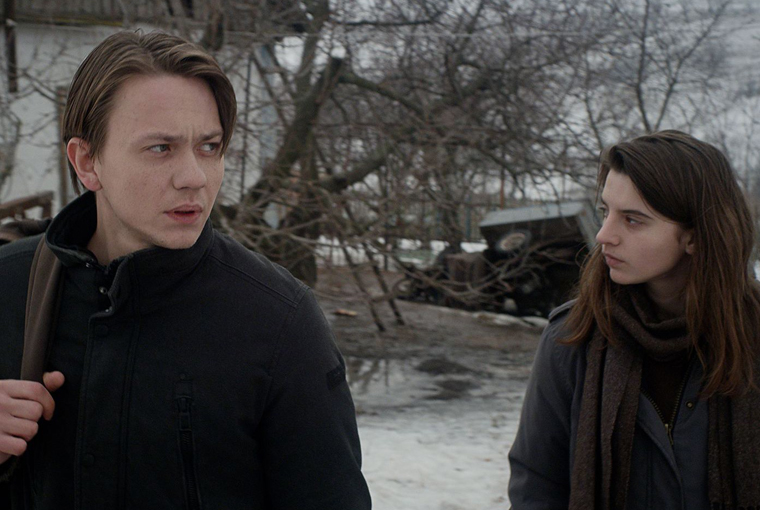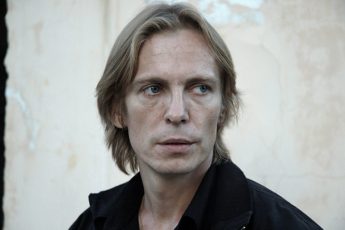
In the unconvincingly titled Frost, Šarūnas Bartas takes the risk surprisingly few other contemporary auteurs have by grappling with the Ukrainian question. Moreover, he does so using a surprisingly conventional format (at least by his standards), following the progression of a linear road trip. Lithuanian Rokas (Mantas Jančauskas) is approached by a friend who is supposed to deliver a consignment of humanitarian supplies to Ukrainian soldiers, but is unable to go himself. Although the details are shady and the whole affair seems highly dubious, Rokas is not only persuaded to go through with it but he also brings along his girlfriend Inga (Lyja Maknavičiūtė).
The film essentially unfurls in three parts. It starts with the invitation and the journey to Ukraine, which is set up with the foreboding atmosphere of a pared-down thriller, in the anticipation of certain disaster from unknown sources. Next, having finally found their shady contact person in Kiev, Andrei (Andrzej Chyra), the three of them end up in a bizarre encounter with a group of international intellectuals in a conspicuously lavish hotel. Between shots of vodka, they all reveal their interest in the Ukrainian situation to be highly self-involved and egoistic. The indulgence of the night peaks when Inga decides to sleep with Andrei apropos of nothing, apparently on a whim. The next day Rokas sulks, but little more is ever said. Finally, in the third thematic block, the couple journey deeper and deeper into the disputed territories, despite this having been explicitly ruled out in the original plan. The landscape (and filmmaking) changes dramatically as the situation becomes more dangerous. Having been inspired by the aspirational philanthropists from the hotel, Rokas changes his personal discourse. He is no longer doing a favor for a friend, but is instead a valiant volunteer taking a great personal risk to supply aid. He also starts to think of himself as a war photographer, and starts to document more and more on his iPhone, impervious to the danger this could get him into.
These three separate elements do not especially sit well together, providing a sense of discomfort that was probably intentional on the part of the director but does not enhance the viewing experience. Bartas’ trademark touches are there, including facial close-ups and sparse dialog privileging poetic allusion over information (which is admittedly a relatively recent emergence in terms of his oeuvre), but framed essentially as some kind of a psychological drama made up of confusing non-sequiturs. Part of the problem is perhaps the excessive absence of backstory and exposition, as this makes it hard to judge or even understand the motivation driving the protagonists. Related to this, the main couple are incredibly flat, with one facial expression each. Rokas gets enough dialog to give some substance to his character, but Inga, who does not speak Russian and is therefore forced to sit mute most of the time, just looks constantly stoned and self-satisfied. As we are given zero information about her it is very hard to interpret her philandering (her one active gesture in the whole film), especially with an uncharismatic 50-year-old she barely knew, and what it means for their relationship, and as the film crescendos she increasingly seems only to serve as a device for adding depth to her boyfriend. Indeed, the most obvious interpretation concerning the affair is that it further motivates Rokas in his attempts at bravado later, in an attempt to validate both his masculinity and his status as a humanitarian.
Another inexplicable presence in the film is Vanessa Paradis, whose brief cameo as a self-reflective foreign journalist does little to justify her inclusion excepts as a means for attracting funding and viewers (the marketing images consisting merely of a decontextualized image of her face seem to support this). The whole interaction between the international set at the hotel does raise important issues, such as Western indifference to the situation in Ukraine, and the use of foreign conflicts as a means of building a career or accruing personal validation. The opulent, imperial atmosphere of the setting certainly makes the dichotomy between those affected by the war and those with the privilege of discussing it more poignant, but the film teeters on the brink of doing the exact thing it strives to criticize. While on the one hand it is entirely understandable why a non-Ukrainian filmmaker would choose to discuss the conflict from an equally non-Ukrainian perspective. Nevertheless, there does come a point when the refracting of the story through the egoist actions of otherwise unrelated people becomes questionable, and borderline problematic as it redirects the discussion around the war away from those actually affected by it.
These doubts aside, visually and poetically the film is strongest in the third and culminating segment, which in turn has the effect that everything up to that point seems almost like a long introduction for the purposes of juxtaposition. The people they meet are at first suspicious and outwardly gruff, but ultimately come to offer them hospitality and support, despite the fact that they themselves are the ones living under conditions of war. In what is perhaps the true crux of the film, or in any case the scene that leaves the greatest impression, Rokas has an in-depth discussion with members of a team that brings back bodies from the conflict areas. Clearly a counterpart to the hotel scene, it takes place in freezing, makeshift barracks with the soldiers speaking bluntly about the sensory and emotional horrors around them. Rokas probes their motivation and the conversation touches on the delicate issues of nationalism and the complexities of Russian-Ukrainian identity politics. “We’re here to kill, not be killed,” one soldier grimly berates him. Underneath his questioning, however, it is clear that Rokas is really thinking about himself, his self-perception and the possibility of conflict spreading to Lithuania. Right up to the conclusion, he seems to view himself as a privileged and untouchable outsider, protected by the (newfound) purity of his intentions. He refuses to perceive the actual implications of the danger surrounding him – and completely disregards the implications for Inga – and instead interprets everything around him as an opportunity to demonstrate his worth.
Frost is far from a masterpiece, and likely falls through the gap of being slightly too conventional for Bartas fans while coming off as unnecessarily indulgent for viewers not otherwise acquainted with his work. Nevertheless, despite its frustrations, there are plenty of moments of beauty and insight, and the final message is powerful, even though the narrative delivering it proves to be surprisingly predictable. Moreover, Bartas does deserve praise for finally addressing the Ukrainian elephant in the room, and for raising important points about the way we discuss it, but perhaps he would have been more effective if he had done it in a style that was more true to himself.




Leave a Comment